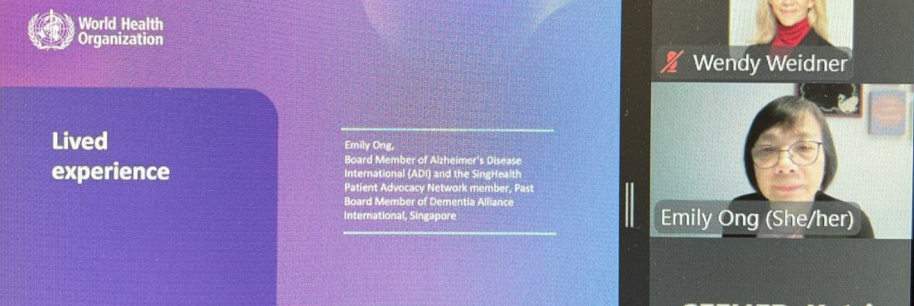Often, when we talk about issues faced by people living with cognitive impairment or dementia, we hardly think of those who are refugees and migrants living with the condition in a foreign land. I am a migrant living with cognitive impairment, and we have no one to turn to for support except ourselves and our families. Hence, I was thrilled to hear there will be a Global Evidence Review on Health and Migration on Dementia.
I was invited to speak at the virtual launch of the findings of GEHM on 31 March 2025. Here is the excerpt of my speech:
Thank you, Dr Santino, for your kind introduction. I want to thank the WHO and Marco’s team for this collaborative report on dementia. It is an honour, and thank you for inviting me to share my lived experience as a migrant in today’s high-level webinar on the findings of the Global Evidence Review on Health and Migration on Dementia.
Since my diagnosis of mild cognitive impairment and young-onset dementia in 2017, I have been an advocate for mild cognitive impairment and dementia. Today’s report launch means a lot to me because, as a migrant, the challenges we face in accessing diagnosis and care are often in silence, feeling vulnerable too if we speak up since we are not citizens of the country.
Over the last eight years, my journey of seeking a diagnosis and treatment has been financially heavy with high out-of-pocket costs. Healthcare is expensive in Singapore, and while the government has revised public healthcare subsidies, they are not available for the migrant community. Subsidised referrals to Specialist Outpatient Clinics in public hospitals are not applicable for migrants, even though the referral is from an eligible source.
Last year, I had to do a neuropsychological assessment after so many years, and I had to pay $700 out-of-pocket. As a result, I only go for the most needed consultations and tests because I have other medical costs to cover. Two weeks ago, I had to do an inpatient sleep study because of my sleep disorder, and the bill came to $1,800 after a maximum deduction of $550 from my Medisave account, a national medical saving scheme. Earlier in my diagnosis journey, one of my consultants offered me an alternative to reduce the medical cost by being a participant in his medical research. However, I lost more than I benefited because my current doctor has no access to all the results from the scans and neuropsychological evaluation related to the research project.
Due to the acquired disability from cognitive impairment, rehabilitation is essential to reduce the impact of the declining cognitive functioning on our quality of life and maintain our independence, autonomy and dignity. However, speech therapy is expensive without subsidies, and thus, I do whatever I can with self-help intervention at home, like changing the food texture and mindfulness eating.
I hope that I will not live to see the days when I have mobility issues and require home modifications or the need to have long-term care due to the progression of cognitive decline. Retrofitting a home or using a home care service to accommodate my future needs would be an additional financial burden to my family.
Not being a local also means I don’t have a shared ethnocultural identity with my peers. I migrated to Singapore in my early 40s, and thus, I do feel “disconnected” during reminiscence activities. The complex identity of navigating between my heritage as a Sarawakian and the culture of my second home, Singapore, is something I am worried about. Will it add more confusion to my life at a later stage? How will this impact my health and well-being? Likewise, what will my future care provision be like as a migrant when I have higher needs to meet?
Hence, I want to conclude today’s sharing with two key messages:
Health equity for migrants and refugees is a human right
There is a need for migrant-inclusive healthcare policies and practices to ensure that migrants and refugees have access to affordable, context-specific, culturally sensitive interventions and equitable dementia care.
Thank you for your attention.

🌟 About DAI
Dementia Alliance International (DAI) is a global advocacy and support organization led by and for people living with dementia. Our mission is to empower individuals with dementia to live with dignity, purpose, and support through peer-to-peer connections, education, and advocacy. Read more here.
🤝 Join Us
Are you living with dementia? Become a member today to access our peer support groups, webinars, and a global community of peers. Membership is free and open to people with a confirmed dementia diagnosis. Sign up here.
💙 Support Our Work
Your donations help us continue to provide free support services, raise awareness, and advocate for the rights of people living with dementia. Every contribution makes a difference. Donate here.
🔗 Connect With Us
Follow us on social media to stay updated!
Facebook | Twitter/X | Instagram | LinkedIn | YouTube
Or contact us directly at [email protected]
